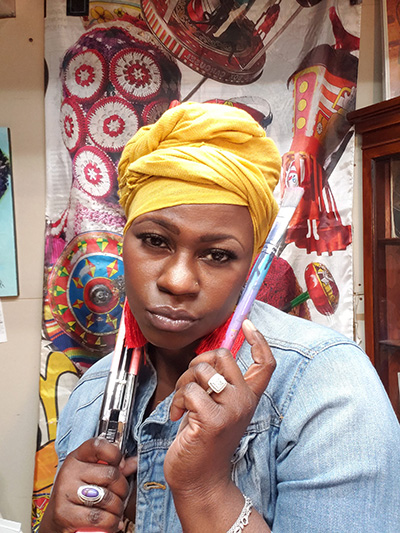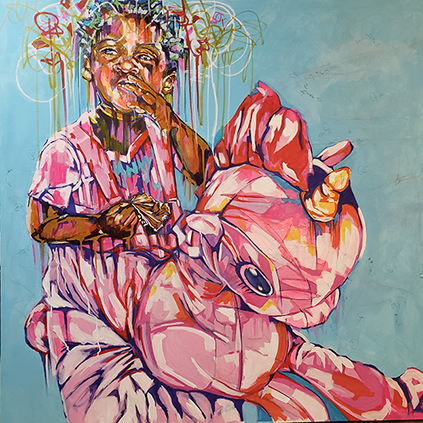“Black Girl Magic” is the secret of one artist’s work.

Auburn Magazine: In an online bio, you describe how growing up in a small Alabama town influences the emotions, thoughts and ideas that animate your work. What about that experience still guides you and your work forward?
Lynthia Edwards: “The works that I create are genuinely about me—I am the true subject behind each and every piece. Having grown up in a small Alabama town is an experience not many people care to talk about. Truth be told, it’s an experience that the world wants to know about. People find the South interesting. My southern black (not a BIPOC) [youth] in a small Alabama town came with a wealth of taboos and cultural richness that influenced my very being to the core. It’s who I am. It’s my truth story. It’s what I know best. It’s my way of preserving who I am, where I’m from and how we do it.”
Did you always want to be an artist?
“No! Growing up, I had dreams of being an obstetrician. My senior year in high school, I took a career aptitude assessment that resulted in 101 career options I should pursue that involved working with my hands. I knew I was creative and could draw, so I decided I’d go to art school.”
What brought you to Auburn? What do you remember most about your time there?
“I came to Auburn to pursue a degree in art education. I mostly remember the amazing studio instructors I had and how I was inspired by them. My time at Auburn was my first experience with true working artists, and my degree in art education was the springboard to my artistic career.
My exposure to these instructors that were living, breathing artists really changed my perspective about becoming an art teacher. I knew then that I was acquiring the skills, knowledge and exposure necessary to evolve beyond the classroom.”
Did you know what kind of medium you wanted to work in as an artist? What did you discover about your creative process while working in the beginning?
“As an artist, I work in several mediums—it really depends on the events happening in my life at the time I’m creating.
Where do you go to find inspiration?
“I’m inspired by my childhood experiences. There are often times when I will get in my car drive to places that are relative to a memory that I just can’t shake off. Those are the ones that become the best works. [But there’s] never a firm idea. I grew up with so many ‘dos and don’ts’s’ that, as an artist, I have to allow myself the freedom to create as I go. There’s never a blueprint to my creation.”
How does your heritage as a southern woman influence your work?
“My heritage as a southern black woman greatly inspires my work. I create work about the southern black girl experience. My experiences as both are the very stories I choose to tell through my art. It influences my color palette, the clothing my subjects wear, and what I will and won’t create.”
What, in your opinion, is the role of heritage or innate culture in the artist?
“I think heritage and culture naturally drives an artist. It becomes their creative voice. It’s the story of who we are as creatives and how we came to be and regardless of what an artist creates there’s always going to be evidence of who we are.”

Tell me about the term “Black Girl Magic” — what does it mean to you?
“To me, ‘Black Girl Magic’ means the ability to defy the odds and celebrate your accomplishments.
In addition to being an artist, you’re also an educator, activist, mother and foster parent. How do you balance all these different roles?
“Whew! There are times it’s really hectic and chaotic. It takes a lot of patience, prayer and super-late nights and early mornings. I don’t do it all by myself. I have adult children that help me out tremendously. All these different roles have certainly inspired my work. There have been times when the simplest chuckle or conversation between children have sparked so many creative possibilities for me.”
At a 2018 exhibition of portraits of famous Alabamians, the late congressman John Lewis purchased your portrait of him, which was based on his mugshot from the Civil Rights Era. What about John Lewis spoke to you?
“I remember the way I felt a as young black girl viewing the footage of the march from Selma to Montgomery. The brutal attack on those foot soldiers traumatized me. I will never forget seeing that for the first time. For years growing up wondered whether the man that was brutally attacked survived. I wondered what happened to him? He was John Lewis—he was a real live superhero in my eyes.”
Tell me about your work with Kate Damon on the DC Sparkle Squad. How did that begin? “Kate Damon and I met the day I was to meet Congressman Lewis. She was a member of his entourage and an art collector. She actually purchased several works as well during their time in Montgomery. Kate and I just vibed from the start and have kept in touch until this day. DC Sparkle Squad was Kate’s idea—it was a way for us to honor the philosophy of our superhero Congressman Lewis. [We] created, designed posters that were to encourage and inspire citizens to activate their superpowers and VOTE.”
What’s next for you?
“What’s next for me is working my tail feathers off to become a well-known artist. Like, when you Google me, I want my photo to show up and labeled as ‘Lynthia Edwards: American Artist’.”
A Foundation to Lead: the Auburn Law Society
A student club started more than 60 years ago has had a far-reaching impact on the state of Alabama.
The Life of George McMillan ’66
From student government president to lieutenant governor and music festival empresario, George McMillan’s life of public service had an outsized impact on the state of Alabama.
An Eye for Action
From the mound to the mountain, Blake Gordon ’03 has captured life on the edge.
A Foundation to Lead: the Auburn Law Society
A student club started more than 60 years ago has had a far-reaching impact on the state of Alabama.
The Life of George McMillan ’66
From student government president to lieutenant governor and music festival empresario, George McMillan’s life of public service had an outsized impact on the state of Alabama.
An Eye for Action
From the mound to the mountain, Blake Gordon ’03 has captured life on the edge.


